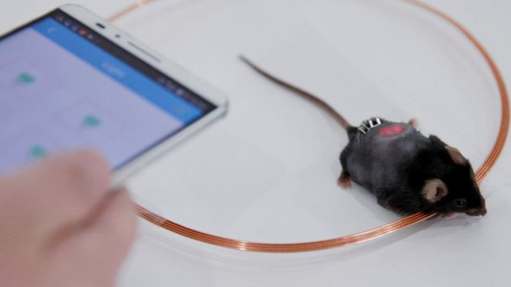导读:将高科技与生物技术相结合诞生控制糖尿病的最新方法,或将开创医学新纪元,实现真正的高精度医学!

The fusion of biology and technology was used to control blood sugar levels in mice with diabetes.
生物和科技的融合已被用来控制糖尿病老鼠的血糖水平。
The idea, described in Science Translational Medicine, could be applied to a wide range of diseases and drug treatments.
《科学转化医学》期刊提出的这一想法被广泛应用于各种疾病及其药物治疗上。
And the Chinese researchers say the approach could pave the way for a "new era" in medicine.
中国研究人员表示这种方法可能会为医学开创一个“新纪元”铺平道路。
The first step was to turn normal cells into living factories.
第一步是把普通细胞变为“制药工厂”。
They were genetically engineered to manufacture drugs that control blood sugar levels such as insulin - but only in response to light.
通过遗传设计它们可以生产出控制血糖水平的药物,类似胰岛素——但这种细胞只在光照下才会开始工作。
The technology is called optogenetics and these cells would kick into gear when exposed to specific wavelengths of red light.
这种技术叫做光遗传学,当这些细胞暴露于特定波长的红光下时,就会开始制造药物。
Then comes the tech - a set of wirelessly powered LEDs and a smartphone app to control them.
然后就是技术活了——通过一系列无线供电LED灯和一款手机APP来控制它们。
Researchers at East China Normal University in Shanghai implanted the system into mice and were able to control diabetes with the tap of a touchscreen.
上海华东师范大学研究员将这种系统植入老鼠体内,然后便可以通过操作触摸屏来控制糖尿病。
The team said the findings "could pave the way for a new era of personalised, digitalised and globalised precision medicine".
研究小组表示,这一发现“可以为私人化、数字化和全球化的高精度医学铺平道路”。
The scientists needed to take tiny drops of blood to know how high the blood sugar levels were so they could calculate how much drug to release inside the animal.
科学家们要取出一小滴血并检测出其血糖量,从而计算出他们需要向老鼠体内释放多少药物。
Their ultimate goal is a fully automated system that both detects sugar levels and then releases the right amount of therapeutic chemicals.
他们的最终目标是开发出一个全自动系统,能够检测血糖水平的同时还能释放出合适剂量的药物。
This idea is clearly at an early stage, but it is not limited to diabetes. Cells could be engineered to manufacture a wide range of drugs.
很显然这一想法还停留在起步阶段,但它不仅仅可以应用在糖尿病上。通过设计细胞可以制造出这种药物。
Prof Mark Gomelsky, a molecular biologist from the University of Wyoming, said the study was an "exciting accomplishment".
俄怀明州立大学的分子生物学家Mark Gomelsky表示这项研究是一个“十分了不起的成就”。
He added: "How soon should we expect to see people on the street wearing fashionable LED wristbands that irradiate implanted cells engineered to produce genetically encoded drugs under the control of a smartphone?
他补充道:“不知多久以后,我们就能看到街上的人们戴着时尚的LED手环,它能在智能手机的控制下使植入的细胞遵循着基因的编码分泌药物。
Not just yet, but the work provides us with an exciting glimpse into the future of smart cell-based therapeutics.
虽然这一想法还没实现,但这项工作让我们预见了未来——建立在细胞基础之上的治疗方法。







